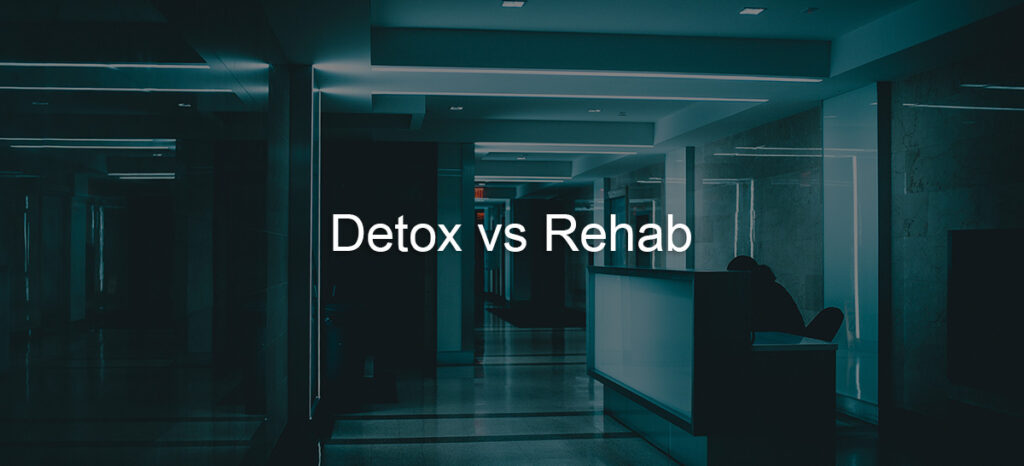Detox vs Rehab

Updated: 31 August 2021
Reading Time: 5 Minutes
What’s the difference between Detox and Rehab?
Many people ask “what’s the difference between detox and rehab?”. It’s a great question. Treatment options can be confusing for people who are researching for the first time. The differences really come down to the core objective of the treatment centre.
Detox
Detox, also called detoxification, is an important process when someone wants to recover from drug or alcohol addiction. Detoxing is different for everyone. Some detox quickly and others can take months or even years. One thing that remains consistent is that it needs to be done carefully. And it should nearly always be supervised.
Alcohol, ice, cocaine, heroin and even marijuana detox is an important step in the recovery journey. It gives the body a chance to start to repair and the mind a chance to start to clear.
It’s important to note that detoxing from drugs like heroin or alcohol must be supervised. It should be done with the advice and support of trained medical professionals. Trying to detox on your own, or going “cold turkey”, can have serious consequences.
Drug detox clinics generally focus on medically supervised withdrawal for a short period of time. They are usually staffed by nurses, doctors and volunteers who are trained to provide care in the area of addiction. They are usually small to medium sized facilities situated in areas that are easily accessible to those who need them.
Detox centres can provide other services like counselling and access to support groups too. However their key function is to supervise the chemical detoxification and withdrawal from drug or alcohol addiction.
They will generally provide suggestions on what the next steps should be for prolonged recovery and abstinence. They may even refer the person to another facility for ongoing rehab and support.
Taking the first step to recovery is never an easy thing to do. This is particularly true for someone who’s actively using drugs and alcohol. Detoxes can provide the essential foundation for someone to make real long lasting changes in their life.
Directline is a great online counselling and referral service for people wanting access to local detox facilities.
Rehab
Once a person has gone through a detox process they can start on their rehabilitation. These processes are usually quite different. Detox is focussed on the dependence and withdrawal processes. Rehab is usually focussed on the psychological issues that led to the addiction in the first place, and the tools required to maintain sobriety going forward.
To experience long term relief from drug or alcohol addiction it’s important for a person to have a program to work through once their detox is complete. Whether that program is a 12-step fellowship, a rehab, or both, it increases the chances of success dramatically.
The benefit of rehab is that it can help a person get distance from their problem. They can start to get to know themselves better. Rehab provides a supportive, safe and comfortable environment to kickstart the recovery journey.
Most rehab programs consist of different components and nearly all involve some kind of counselling. At the heart of rehabilitation from addiction is a desire to change the way we think and feel, particularly about ourselves.
Rehabs that utilise a combination of one on one counselling, group therapy and education therapy are popular as they take a multi disciplined approach to treatment. Unlike detox clinics, rehabs offer more time for a person to really get to the root of their problem.
Another thing that people often get at rehab is a sense of community. They start to feel like they are part of a group of like minded people. These people also want to stop using drugs or alcohol. This community can be instrumental in long term success of rehab as it provides support, comradeship and love where it perhaps didn’t exist before.
Combined Treatment
Some facilities offer both detox and rehab as part of the same program. They are usually hospital settings and often last for 28 days or longer.
When a patient who has been using drugs or alcohol enters the rehab they will be placed on a detox program for the first week or so. Nursing and medical staff will oversee their substance withdrawal and provide a safe environment for detoxification. Depending on how well the patient is, they may start the rehab component at the same time as their detox, but often they will just spend the first few days or week resting and regaining their energy.
Detox in one of these combined facilities can be beneficial as it may enable the counselling and therapy to start earlier on in the recovery process. But most of these programs are only a few weeks long and it’s often recommended that the patient continue their rehabilitation at a dedicated rehab after their stay.
Dedicated Rehab After Detox
There are benefits to doing detox separately to rehab. Because the two phases are so different, with detox being very focussed on the medical withdrawal and rehab being centred around the ongoing therapy, it can be overwhelming for these functions to be mixed.
Finding the right environment to do both parts of the recovery journey is important. Recovery is an investment of time, effort and often money. People who can afford the time will often find benefits in doing dedicated rehabilitation after their detox. Often longer term rehab can also help with relapse prevention, which we discuss in our Relapse Prevention article.
Where to Next
Many Refocus clients choose to start their journey with a brief drug or alcohol detox or a 28 day combined program. They then come to our small 10 bed private facility to consolidate their recovery and start to make real changes in their life.
If you’d like to find out more about detox, rehabs or the program at Refocus, please get in touch with Barbara or our friendly team.
Photo by Brandon Holmes on Unsplash
